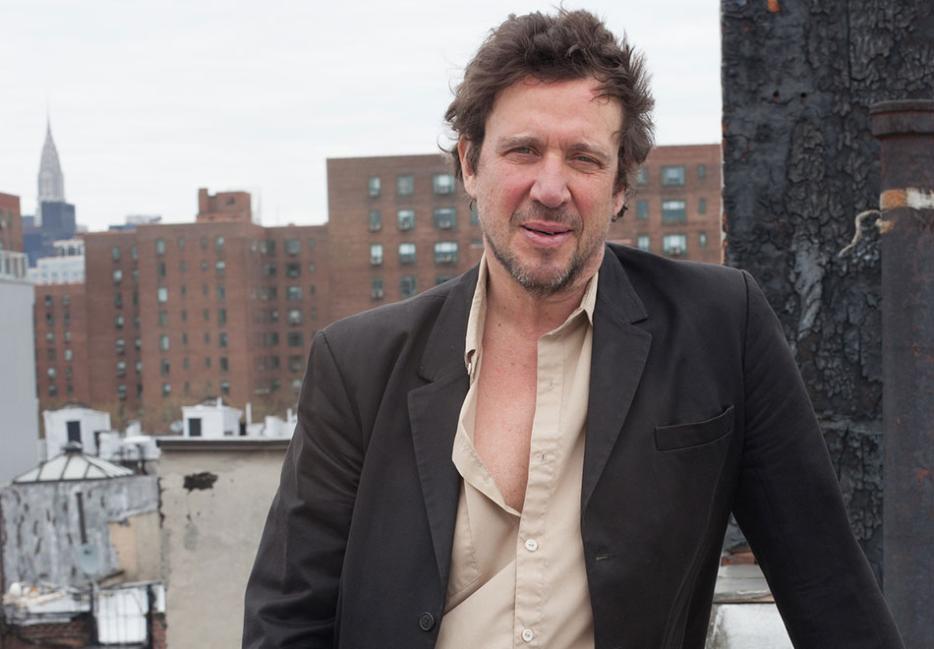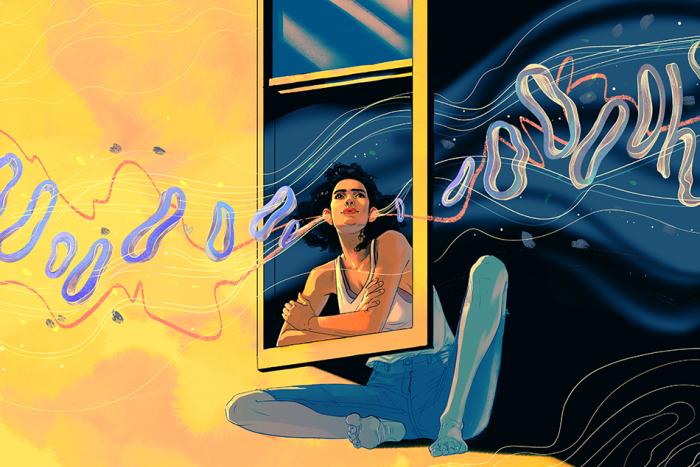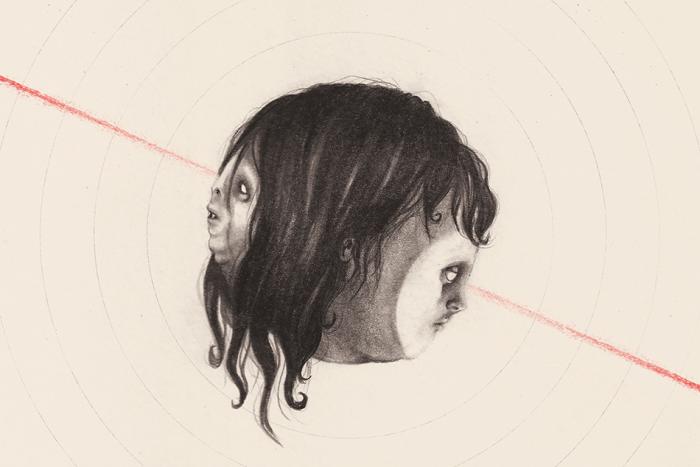For years, Richard Hell was plagued with regrets over how his sophomore album with the Voidoids turned out. He calls the original version of Destiny Street a “morass of trebly multi-guitar blare.” But it didn’t seem like there was much he could do about it—the 24-track master tapes had disappeared.
In 2009, he decided to create a new, definitive version of the record anyway. He re-recorded it with new vocal and guitar takes, using a cassette of rhythm tracks from the original recording sessions as the basis for a reinterpretation of the LP. This is the version of the record Hell has stood by since its release.
Then, a decade later, the masters turned up; in 2019, Hell was returned three of the four tapes, discovered languishing in an Intergalactic Studios storage facility in upstate New York. Bringing on Nick Zinner of the Yeah Yeah Yeahs and engineer Erin Tonkon to help him produce and oversee the remastering of the album, a deluxe package known as Destiny Street Complete will be released in January 2021. It includes the 1982 original release of the album, 2009’s Destiny Street Repaired, the new 2021 remaster, and a host of demos—making good on the title track’s spoken word prophecies of meeting a younger version of himself in an uncanny time loop.
Across five spirited and chaotic decades, Richard Hell’s career has defied categorization. His musical contributions with Television, The Heartbreakers, and Richard Hell and the Voidoids during the early waves of punk rock have been hailed as period-defining. Battling heroin addiction, Hell pivoted away from music in 1984 to escape the temptations of the rock ‘n’ roll musician’s lifestyle. After acting roles in films such as Susan Seidelman’s Smithereens and Ulli Lommel’s Blank Generation, Hell established himself as a writer and cultural commentator, publishing with Spin, GQ, and The New York Times Book Review. His books include The Voidoid, Hot and Cold, Go Now, Godlike, Massive Pissed Love: Nonfiction 2001-2014, and his mordant autobiography, I Dreamed I Was a Very Clean Tramp.
I corresponded with Richard to reflect on the album’s 40th anniversary, his work philosophy, and his future plans in a post-pandemic world.
Jean Marc Ah-Sen: The big news on your end is Destiny Street Complete. This is the second time you’re tackling the album’s re-release. Was it perfectionism that motivated the undertaking? I’m curious if revisiting projects is part of your broader artistic practice, or if this was more because of your dissatisfaction with the original recording.
Richard Hell: I don’t think I have an artistic practice. Maybe it’s laziness mixed with obsessiveness? Writers usually think of the first draft as being the hard part, while the revising is fun. So, me, in whatever medium, I would rather have fun. Anyway, the execution is more interesting than the content. Take the way blues songs can be so similar to each other—it’s how they’re performed that matters. I had the fantasy after we released Blank Generation in 1977 that I’d never make an album of other songs, but just re-record that one differently every eighteen months.
All that said, Destiny Street was frustrating. I was in a bad way when I made it and it shows, and pretty soon I wished I could fix it, especially since I’d left the music life right after, which meant I only had two albums forever. I made the first run at it in 2009 using a 1981 reference-cassette I’d found containing only the record’s live-played rhythm tracks—bass, drums, and two rhythm guitars—no vocals or solos. I realized I could make a clean version of the songs with it. I was able to get Marc Ribot, Bill Frisell, and Ivan Julian to do the soloing. [Robert] Quine would have played on it if he’d lived. It was an improvement on the original version, strictly as an album of recordings of songs, whatever pros and cons there might be. Then, in 2019, when the 1982 24-track masters were found, I was able to carry out my fantasy of remixing the original. In my opinion, each version improves on the one before, but each has its own feel and is valid, with some tracks on it that are the best of the series. And to me it makes for a cool story—a story about time and fate (destiny), kind of, as well as all the banging around and weirdness.
I wanted to ask about the album’s three cover tracks. The Kinks’ “I Gotta Move,” Them’s “I Can Only Give You Everything,” and Bob Dylan’s “Going Going Gone” seamlessly weave through the other tracks. A listener could be forgiven for thinking they were your compositions. Were these songs you and the Voidoids happened to be playing around that time, or were they meant to complement the seven original compositions from the album in some way?
Well, you know, my first album was pretty much written in four or five months when I was still new to songwriting. I’d only been a musician in bands for two years and half of the few songs I’d written were collaborations. So, the songs on Blank Generation were pretty much experimental—I was figuring out what did what. When it came time to make Destiny Street, three or four years later, I’d learned more about songwriting and I wanted to make an album of the kind of music that originally inspired me: American garage band music, the music I grew up on as a young teenager in the ’60s. Garage band music came out of the most driving English invasion songs—“I Can Only Give You Everything” was probably played by every second American bar band in the mid ’60s. That and “Louie, Louie.” And Bob Dylan, the sneer and the drive of his early electric albums. So that garage music—which is actually the music that was first called “punk”—was the inspiration for half of my songs on the record, and it was only natural to include some related covers too, the kind of repertoire of the ’60s party bands. This is how I think of it, though I can’t swear how conscious it was at the time.
At any point in the process of putting the record for Omnivore together, were you tempted to return to the music business? You’ve done really well with your writing career, but a whole new generation got turned on to you when you reissued your debut record Blank Generation, and that’s likely only going to continue now.
That album has stayed in print since it first came out on CD in the early ’90s, but there was a new surge of publicity and attention when the two-disc 40th Anniversary Deluxe was released in 2017. Also, the awareness of and respect for “punk” has grown steadily since at least the mid ’90s. Nirvana and Please Kill Me had a lot to do with that I think. The Ramones went from being a novelty to being an American classic almost overnight. It’s been interesting. But no—I’ve never been tempted to return to playing music as a working, touring band. Though if Quine had lived, the original Voidoids might well have made another album. We all thought it was a good idea after the one-off recording of a single song (“Oh”) we did on commission in 2001. But as far as getting pulled back in, no.
Are you at all interested in where punk music is headed? You’re often touted as one of the prime movers of punk rock—you put the first safety pin through your shirt, right? There’s been a bit of a renaissance of late, from Australia and the UK in particular. I don’t know, maybe the conditions of living now are similar to those in the mid-seventies.
You know, I don’t pay a lot of attention to popular music anymore, and I never paid any special attention to what people called “punk.” What I wanted to do when I started out in 1973 was replace the faux-symphonic and stadium and fake-hero overblown posturing that rock ’n’ roll had become by the end of the ’60s. I wanted to play music like what I originally loved: brief, driving, often angry, little spurts of real life. It’s kind of a teenage thing, or a young person’s thing. I was also excited by the possibilities of making all the other evidence of a band consistent with the messages of the music: the clothes, the hair, the graphics, the interviews, etc., etc. Some of those things got associated with sets of bands that were classified as “punk.” But I’m not into music by genre a lot—I just go for what moves me.
I feel that your writing career has never shied away from provocation or archly probing the fringes of human experience. William Gibson described your novel Go Now as “vile, scabrous, unforgiveable, and deserving of the widest possible audience.” It was an indictment of heroin usage ending with the narrator Billy Mud violating a major social taboo and relishing the experience, while Godlike centred around a love affair between two poets, one of whom is underage. What’s your perspective on recent occurrences of staff protesting releases by their own publishing houses before audiences can decide on their merits? Do you think it’s a politically viable response?
I wouldn’t call the book an indictment of heroin usage. It doesn’t have a crusading agenda that way. It’s just trying to capture the psychology and experience, as known to me, of narcotics addiction in the time and place it’s set. But your question is interesting—regarding this extreme sensitivity that’s developed on the left about appropriating other people’s experiences, which is kind of the definition of fiction. I suppose that’s part of the reason “autofiction” has become so popular: the people you hurt are only your own friends and family, not the rest of any readers, who may be offended and get angry at an author (or publisher) for a work that presumes to have a character from a demographic to which the author doesn’t belong (“identity politics”). But at least these demographics are not intimately betrayed and injured to the degree that a character in an “autofiction” may well be, so, then publicly, it’s safer for the writer, since significant segments of the general population aren’t being offended—only his or her friends and family. The whole thing is complicated, but for the most part I’m against putting anything off limits as material for artists. It’ll all come out in the wash. At the same time, I am in favor of seeking out and giving platforms to peoples who’ve been underrepresented.
You don’t seem to get writer’s block, ever. Year in and year out, your list of projects and backlist seems to get more staggering. Is productivity a question of discipline, a philosophical frame of mind?
This question amazes me. I am really lazy and basically don’t see the point in doing anything, except that I’ve learned that it feels better to apply oneself, so I do, but not that much. And there’s also that itch to just assert—you know, like graffiti, like just putting your name on some wall. I guess I feel that. I want to be represented like everybody else. There’s this thing where you know you only really exist internally, that the subtlety and complexity of things isn’t present except inside, and you want to express it, depict it, just because it’s all you have and know, and the only way to do that is in art. That’s an urge. I will start feeling really bad if I don’t do anything. But I am not prolific.
Are there any new frontiers you want to explore in your writing? New disciplines? You’ve professed an admiration for painting for quite some time now.
I’ve always been interested in movies and painting and I have experimented a little in both. I feel like I could produce good work in those mediums, but I’m too lazy. Finally, I am a writer. It’s the easiest art medium because it doesn’t really require any cooperation from anyone else or any equipment to speak of. As for new frontiers in writing—every damn morning is another one.
Are you planning on writing more memoirs? Your autobiography I Dreamed I Was a Very Clean Tramp ended its chronicle of your life in 1984 when you got clean and quit the music business. Do the last four decades warrant more self-interrogation, or is it still a question of protecting people in your life now?
I think I already covered the action. Though maybe I’ll completely rewrite Tramp. Kidding about that, but it’s crossed my mind, in that it could have been written completely differently—with different attitudes towards things—and still be true.
You have an extensive book collection comprising many first editions. You even tried to set up shop as an antiquarian bookseller at one point, right? Where do you stand on the digital proliferation of e-books, and of online book stockists dominating the book market?
You must be referring to that one road trip [Tom] Verlaine and I took when we were nineteen and working in bookstores and thought we’d go out book hunting with the idea of then publishing a catalogue so we could quit our day jobs. But then we couldn’t part with the books, so that was the end of that. I’m really sorry to see bookstores die off, but I don’t think material books will ever be replaced by electronic ones. I’m glad I was young when dusty used bookstores were everywhere, but it’s also pretty cool to be able to find almost everything online. I would still much rather hold a book in my hands before I buy it. I imagine bookstores will have to become boutique affairs that are highly curated and cater to people like me who love books and have specialized interests in them.
Your list of favourite films published on Criterion’s website was much talked about. I was really happy to see Léon Morin, Priest's inclusion, which I think is Jean-Paul Belmondo’s best film. There were no films from the past forty years, though. Have there been any recent films that you've enjoyed?
Where was it much talked about? Also, they weren’t my favourite films—the company invites people to pick their favourite films that are available through Criterion. Criterion is fantastic (speaking of curated merchandise), but it doesn’t have every great film ever made, or even every great film that Bresson made.
Too many good more recent films to tabulate in my head. The wildest, most unlikely one is The Shining Forwards and Backwards. Hale County This Morning, This Evening; Meek’s Cutoff; Gummo; Tarnation; Diane, much Chantal Akerman... These are completely random—I have a terrible memory and it hurts my brain to try to remember the best, most interesting movies I’ve seen in the last few decades. Especially now that, with streaming, I see a movie almost every night...
Can I persuade you into giving a list of your favourite books?
Sorry, my list of favourite books is boring. Proust, Borges, Primo Levi, etc. Everybody knows how good they are. I’m also excitable and lacking in the identity department—I often completely identify with any halfway decent artist I am checking out. One day I’ll be Raymond Chandler, the next day I’ll be Nietzsche, the day after that I’ll be Susan Sontag. I just like books; in many ways I like them more than people.
Despite the pandemic, you've had a productive year. It just seems like business as usual. On top of finishing Destiny Street Complete, you had a Gucci clothing line show using images from Psychopts, your book with Christopher Wool, and you participated in the Anthology Film Archive's 50th anniversary video testimonial celebrations. What projects are you working on that will take you into 2021 and beyond?
Since March lockdown, I’ve been steadily writing poems for the first time in my life, and that makes me happy.






